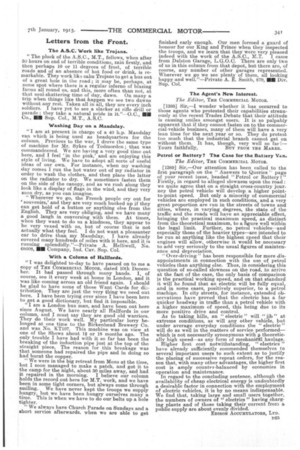The Agent's New Interest. The Editor, THE COMMERCIAL MOTOR.
Page 7

If you've noticed an error in this article please click here to report it so we can fix it.
[1388] Sir,—I wonder whether it has occurred to those agents who protested their capabilities strenuously at the recent Trades Debate that their attitude is causing smiles amongst users. It is so palpably apparent that if they cannot fasten on to the commercial-vehicle businses, many of them will have a very lean time for the next year or so. They do protest too much that the industrial branch cannot get on without them. It has, though, very well so far !—
Yours faithfully, Buy FROM THE MAKER.
Petrol or Battery? The Case for the Battery Van. The Editor, THE COMMERCIAL MOTOR.
[1389] Sir,—Our attention has been called to the first paragraph on the "Answers to Queries page of your recent issue, headed "Petrol or Battery 'e " Firstly, in regard to alleged slowness upon the read: we quite agree that on a straight cross-country journey the petrol vehicle will develop a higher pointto-point speed. But only a minority of commercial vehicles are employed in such conditions, and a very great proportion are run in the streets of towns and cities, where, in varying degrees, the state of the traffic and the roads will have an appreciable effect, bringing the practical maximum speed, as distinct from the theoretical maximum, to a figure well within the legal limit. Further, no petrol vehicles—and especially those of the heavier types—are intended to be run at anything like the highest speed that their engines will allow, otherwise it would be necessary to add very seriously to the usual figures of maintenance and depreciation.
" Over-driving " has been responsible for more disappointments in connection with the use of petrol vehicles than anything else. Thus, in considering this question of so-called slowness on the road, to arrive at the fact of the case, the only basis of comparison is the practical working speed, and on that standard it will be found that an electric will be fully equal, and in some cases, positively superior, to a petrol machine. In city streets, for instance, extended observations have proved -that the electric has a far quicker headway in traffic than a petrol vehicle with a higher maximum of speed, this being due to its more positive drive and control. As to taking hills, an " electric" will " jib " at extreme conditions, as will any other vehicle, but under average everyday conditions the " electric" will do as well in the matters of service performed— which is not necessarily synonymous with a theoretically high speed—as any form of mealianit11 haulage. Higher first cost notwithstanding, " electrics " have already sufficiently commended themselves to several important users to such extent as to justify the placing of successive repeat orders, for the reason that, with many other advantages, the higher first cost is amply counter-balanced by economies in operation and maintenance. In regard to the concluding sentence, although the availability of cheap electrical energy is undoubtedly a desirable factor in connection with the employment of electric vehicles, it is by no means indispensable. We find that, taking large and small users together, the numbers of owners of " electrics " having charging plants and of those taking their current from a public supply are about evenly divided.
EDISON ACCUMULATORS, LTD.


















